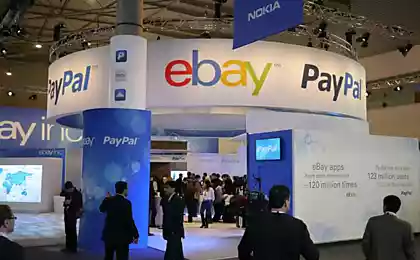Peter Thiel: competition - the lot of losers
Ctenfordsky course CS183B: How to start a startup. Was launched in 2012 under the leadership of Peter Thiel. This fall is a regular series of lectures:
- Sam Altman and Dustin Moskowitz: why and how to create a startup? a href="http://habrahabr.ru/company/friifond/blog/242347/"> Sam Altman: how to build a team and culture startup?
- Пол Graham: illogical startup
- Adora Chyung: (Part 1) produkt honesty and curve ; (Part 2) growth hacking
- Peter Thiel: competition - the lot of losers
Sam Altman: All good day, today we favor Peter Thiel. Peter - the founder of PayPal, Palantir and the Founders Fund, invested in a lot of technology companies in Silicon Valley. He will talk about the strategy and competition. Thank you for coming, Peter.
Peter Thiel: Cool, Sam, thank you for inviting me.
I have a kind of "obsession" - [topic startups] incredibly attracted me from a business perspective: if you create a company if you - its founder, entrepreneur, you should always aim for the formation of monopolies and seek to avoid competition. And, as soon as the competition - the lot of losers, today we will talk about it.
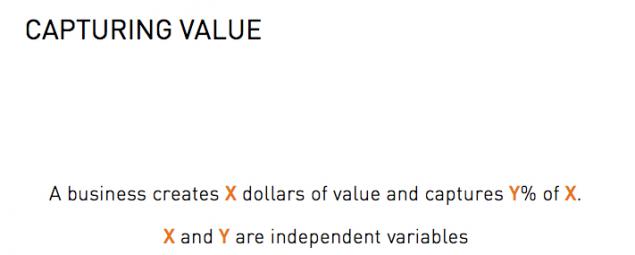
I would like to start with a couple of words about the basic idea that underlies the establishment of the company, how are you going to ensure that it (the company) value. What makes a business valuable?
I would suggest that the formula for the answer to this question is quite simple. If your company has a value, then you are just two propositions: first, the value of the company for the world is expressed in a certain amount of money (X), and secondly, some part of this amount (Y) moves you. People are constantly overlooked that X and Y - absolutely independent variables, so that even if X is a relatively large sum, the value of Y at the same time can be quite small. Or X may be a medium-sized, that for sufficiently large values of Y allows your company to be big business.
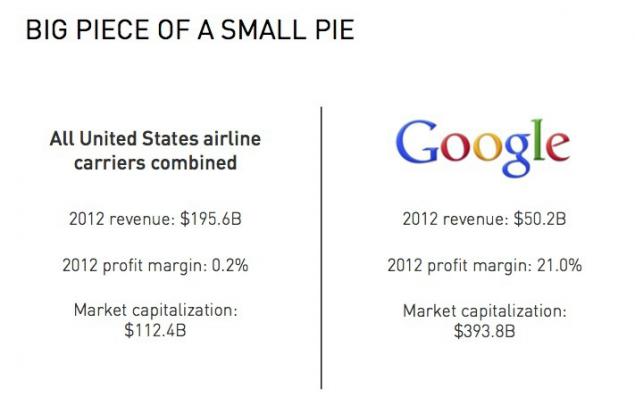
Therefore, to create a company that has a high value, you need one hand to do something of value, and on the other - to keep part of the value itself. To illustrate the difference between these two concepts, give an example: try to compare air travel industry and the US company, discovers on the Internet, such as Google. If you measure the volume of these sectors (in terms of revenue), it was concluded that air travel is much more important than the search.
In 2012, air carriers earned on flights within the country $ 195 billion, and Google has earned during this period, only $ 50 billion. And of course, if you put before a choice and offered to give up either from air travel, either from search engines, intuition told to you that traveling is more important than a web search (I quote figures for the US only).
If you look at the figures for the world as a whole, you'll see that the business of air carriers is much larger than a business web search engines, business Google, but the profitability of airlines have somewhat less. The airline business was profitable in 2012, but I think for the whole airline industry a century of cumulative profits of air carriers in the US was approximately zero. Companies make money occasionally go bankrupt, reorganize its capital structure, and the whole cycle repeats again.
This is reflected in the total market capitalization of air travel, which is about a quarter of the capitalization of Google. Therefore, web search, being much smaller industry than with air travel, generates greater value. This example is, in my opinion, reflects the very differences in the measurement of X and Y.
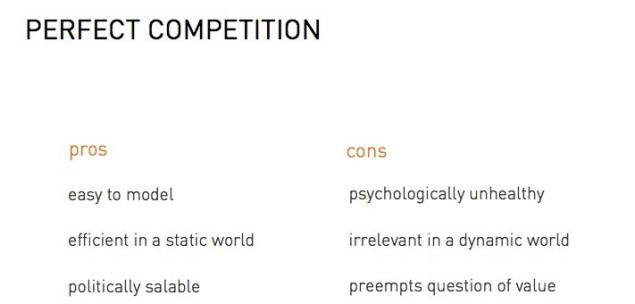
If you take the perfect competition, then it has its pros and cons. In general terms, this is what you learn in the base rate of the economy, is a condition that is very easy to model - so teachers economics and love to talk about perfect competition. In some ways it is effective - especially in a world where things are static, because any company in such a system can meet the growing demand.
In addition, politicians tell us that perfect competition is good for society: they say we need competition, and because it is useful. Of course, it has many shortcomings - as a rule, work on the ultra-competitive market adversely affects the business, because in this case, he is not likely to earn. I will come back to this.
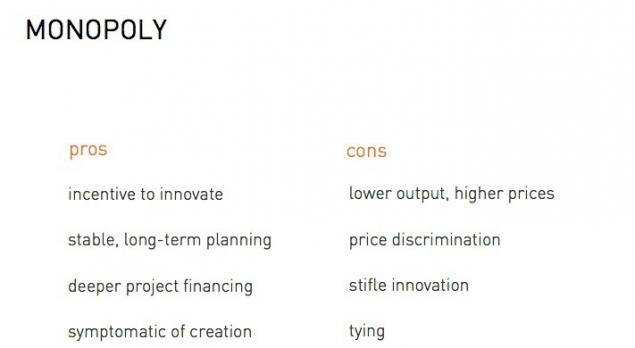
So, in one part of the spectrum you have the industries in which thrives perfect competition, and the other - a monopoly, which is much more stable in terms of long-term business development and generate more capital. And if you create a monopoly for the creative invention of new products, you will, in addition, will inevitably produce something of value.
I am convinced that from the point of view of the entire division into black and white (I always emphasize it) in the world, there are only two types of companies. There are businesses in the market of perfect competition and monopoly companies have. Amazingly small number of companies is somewhere between these two extremes.
And this dichotomy is quite difficult to understand, because people constantly lied, telling about the nature of the business in which they are involved. In my understanding, this is not necessarily the most important part of the business, but I think the idea that there are only two types of companies - that's what people do not understand.

Now I want to tell you about what people are lying. If we imagine that there are a range of companies, from perfect competition to monopoly, the external differences between the companies within this range will be minor, because those who run monopolies, pretend it is not. You would never admit that presiding monopoly, because I do not want to come up to you guys from the Anti-Monopoly Service, and start your company to monitor the government.
Therefore, anyone who has a monopoly, will pretend that lies within the incredible competition. On the other hand, if you are in a highly competitive environment, a company that can hardly earn, you'll have to resist the temptation to lie on the opposite topic: you say that your product is unique in that you are working on a less competitive market than it actually, because you want to stand out, to attract capital or something else like that.

So, if the monopolist pretend that their company - not a monopoly and non-monopoly - on the contrary, the visible differences between them are negligible, while the real - very significant. The distortion of the real situation in business arises from the fact that people are lying about the state of their companies, and the lie is directly opposed to one other lie.
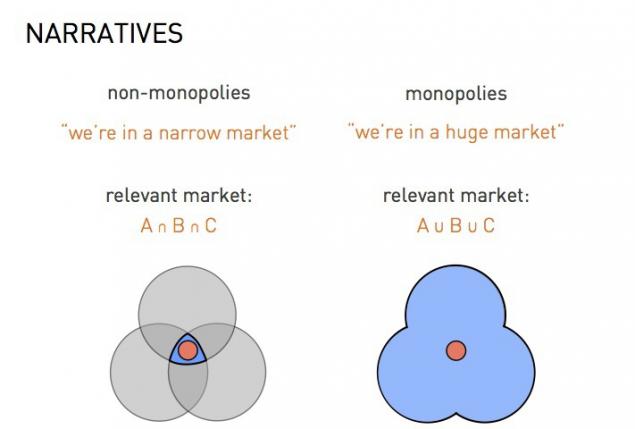
I want to delve into a description of how this lie. So, if you - not a monopoly, you first begin to tell that you are working on a very small market. Otherwise, you'll say that your market is much more than it seems.
So, if we express it in the form of theoretical terms, the monopolist will say that his business runs on a large number of disparate markets, rather than monopoly will insist that it is at their intersection. As a result, non-monopolist will describe their market as a super-small, as if he - the only player on it. A monopolist will say that its market is extremely large, and it works a lot of competing firms.
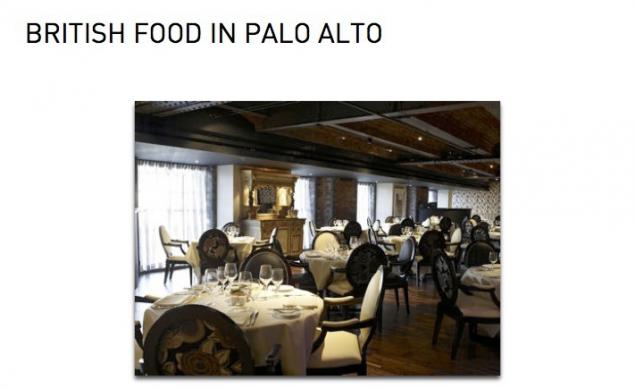
Here are a few examples of how this works in practice. I always say about restaurants when I want to give an example of the terrible [highly competitive] business. There is the idea that the accumulation of capital and competition - antonyms. If someone accumulates capital, in a world of perfect competition, all of it is to ensure competitiveness.
Therefore, when you open a restaurant, you will not want to invest, and for fundraising are you talking about a story that helps you show your personality, for example, a story about the fact that "your restaurant - the only institution with British cuisine in Palo Alto ».
So you - British restaurant in Palo Alto, and your market looks really small because you can drive right up to the Mountain View or even to Menlo Park and not meet a single person who would be fed exclusively British cuisine (if you do not take into calculation of those who have died long ago). This is - an example of deliberately low market valuations.
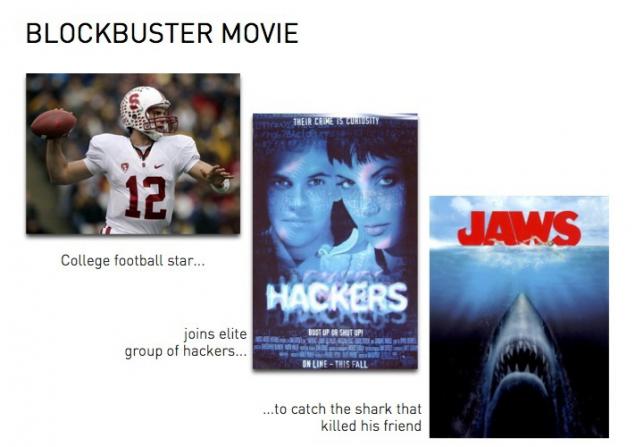
An example of this approach is that in Hollywood - it always takes decisions on the launch of new films. Suppose it is a picture in which the best player of the university American football team ... joins a group of elite hackers ... to catch a shark that killed his friend. The film has not yet been cleared, but the question is: "This is a good option? Or is it just another of the many other movies? ". This - Superconcurrent environment in which extremely difficult to make. No one in Hollywood does not make movies on creating - it's very, very difficult.
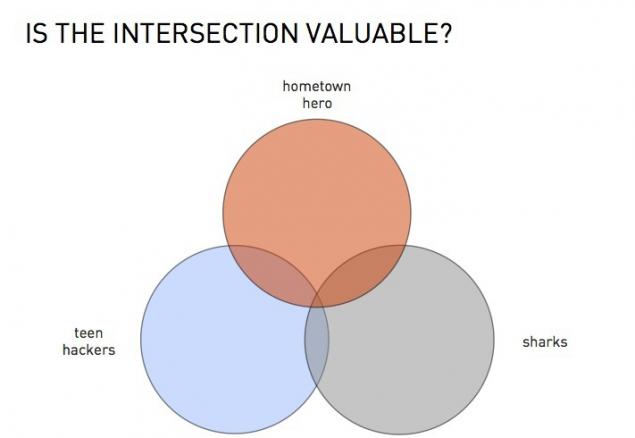
You probably want to know if there really is something at the intersection of films about hackers, soccer players and horror with sharks? Does this make sense? Does the value of such a project?

Of course, such examples exist in the world of start-ups - and in the worst case, it's just a pile of "buzz words", such as: shering, mobiles, social networking - and you juggle them to get some history. Regardless of whether this is a real business or not, it is - a bad sign.
It's like pattern recognition - if you see such a description or a similar type of intersection, you know that they usually do not work.
«Something like X, but only for Y» - it's just "niochem": if you create Stanford, but in North Dakota, and this one of a kind, then it is not Stanford. Blockquote >
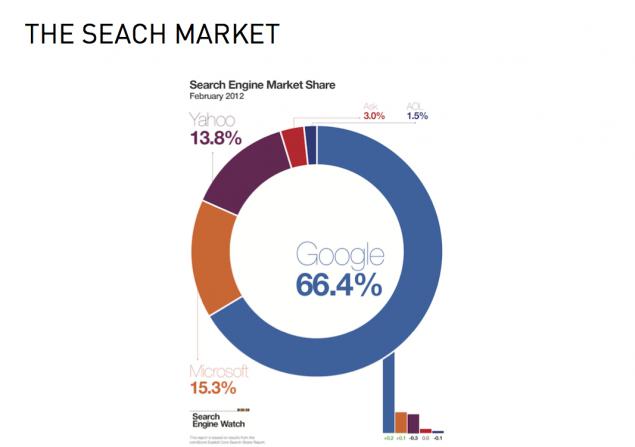
Let's look at the opposite option lies - take, for example, a company that deals with web search, is located not far from here, takes a good 66% of the market and a dominant position in its segment. Google is now virtually speaks of himself as a search engine, on the contrary, they use a completely different description: sometimes, for example, in Google say they are engaged in advertising. But if it's still a search engine, the company's share in this market is just fantastic, it's the most powerful monopoly, much more powerful than Microsoft in his best years, and perhaps that is why it makes so much money.
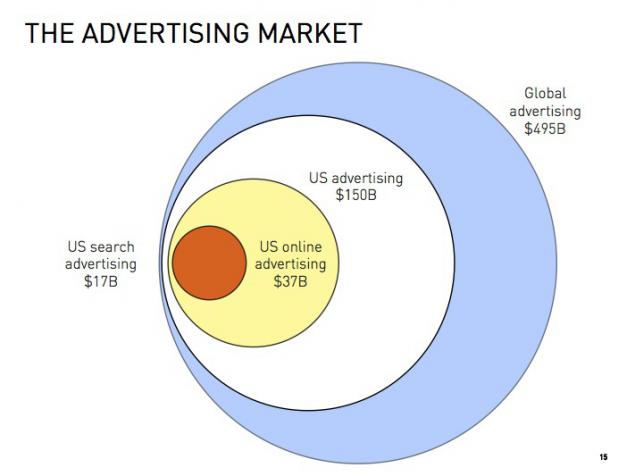
If you look at the advertising market, you will see the following: market advertisements in the search results is estimated at $ 17 billion, and is just one of the options display advertisements on the Internet. And advertising on the web, in turn, is only a fraction of the advertising market the US as a whole, not to mention the global advertising market, which is estimated at about $ 500 billion - from this point of view, Google takes only 3, 5% of the market - a tiny fraction .
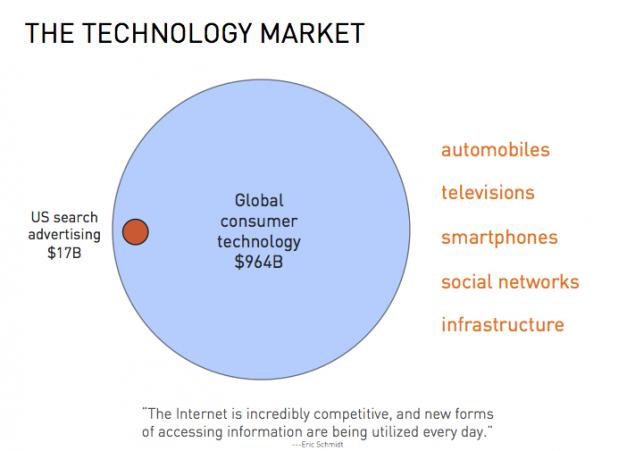
If you do not like to be advertising company, you can always be called a technology company. Technology market as a whole is estimated at about a trillion dollars, and in this case, Google is "the legend" to compete with all the companies that are engaged in the development of unmanned vehicles, with Apple TV and iPhone, with Facebook, with Microsoft in the market "office" applications With Amazon in cloud services: it is a huge technology market where competitors come close to you from all sides - and not talking about any monopoly, so that the state is certainly nothing to worry about. I think we should always be on the alert - there are always reasons somehow distort the nature of these markets.
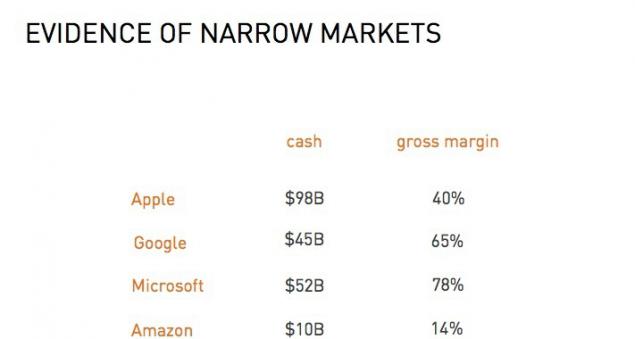
Evidence for a small market within the technology industry is the fact that all the major technology companies: Apple, Google, Microsoft, Amazon, accumulate capital year after year and achieve amazing high profitability. I would say that one of the reasons why the technology industry in the US has been so many years of financial success lies in the fact that it contributed to the creation of monopoly inherently companies. This is confirmed by the fact that all of these companies accumulate so much money, that after a certain point no longer understand what to do with them.
[Note. .: pens in the second part of the lecture, Peter says on creating monopolies and expect to continue this week.] i>
Source: habrahabr.ru/company/friifond/blog/245319/















